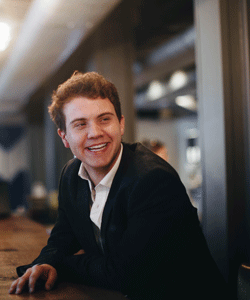To set the stage: Duke University Improv’s (DUI) orientation-week show for new first-years. We ask for a suggestion of a word—any word at all. Responses are weak, which is to be expected, and finally we’re able to pull a quiet noun out of a boy in the front row. “Bomb.” Endless opportunity (please, no terrorism). So many directions that this could go in (don’t mention the 11th of September). Where will this word take us?
I open hard with an Al-Qaeda reference. Silence from the audience. Not a giggle, or a snort, or even a stifled grin. Just silence. Needless to say, I know I screwed up, and I show it on my face, trying to save myself with another lame, “explosive” comment. Again, silence.
There’s so much in that silence. Blank stares. Maybe a grimace or two. It’s times like these when I feel the most afraid. I get that sick and murky feeling in my gut, and kill-me-now thoughts ll my head, my mind racing that I’ve ruined DUI’s reputation. That all the freshmen are thinking I’m some ignorant white kid. And of course, the most soul-crushing thought an improviser can have: “They don’t think I’m funny.”
For me, so much of comedy is in the audience. I want people to laugh and smile, bouncing energy off of them and radiating it back onto myself. That’s what makes me tick, makes me feel like I’m doing something bigger than myself. Without that I’m just a weird kid running around on stage, ailing and doing a bad Russian accent. When I hear silence, I lose that meaning, that purpose, that drive. I’m terrified to live without that.
Obviously, I’ve put all my eggs in the same basket, and one that’s temperamental. A bad room means a week of wanting to quit my (albeit short) comedy career and pursue a life in the shadows. “I’ll never joke again,” I tell myself, dramatically lifting my hand to the mirror. “Funny, I am no more.” It’s hard to be confident on stage after silence. I go in fearing it, hating it.
I think funny people—comedians, improvisers—often feel like they’re moving through the world by themselves. That’s why the audience is important. A room full of strangers to validate the life that you’re living. What a hard way to exist, right?
Luckily, I know I’m not in this alone. My improv troupe has everything to do with that. They’re my forever audience, validating my comedy and my ideas, even when I’m scared they won’t land. Or, they’re helping me change them.
They don’t let me soak in the quiet stares. They lift me out of those stares by laughing or criticizing. So much of dealing with my fear of silence has been finding people who validate me, even when I’m not funny. People who are willing to take me at my most caustic and callous, my most ignorant and selfish. People who help me look in the mirror and say, “I am funny. I am smart. I am kind. I am important.”
Back to the stage: My last terrorism reference hangs heavy in the air, my eyes darting from audience to scene partner. “Help,” I try to blink to my fellow improviser. “Been reading the Westboro Baptist newsletter again, haven’t you, Uncle Bart?” A lifeline, glorious lifeline. “I can’t help it. The headlines are so damn colorful.” Laughter. Sweet, sweet nectar of the comedy goddesses. My murky belly dissipates. I wink a “Thank you” to my friend on stage. One of the people I care about most in the world. The scene continues, and I live to improvise another day.
Hennessy is a rising junior at Duke, studying linguistics and French. He is also an improviser and the current program director of Project Arts. He has spent the summer working in New York, reading, and searching for the perfect taco.

Share your comments
Have an account?
Sign in to commentNo Account?
Email the editor